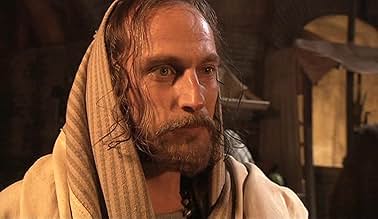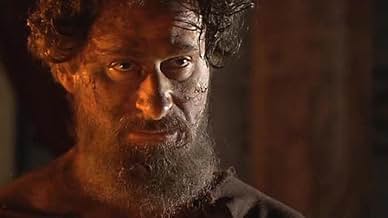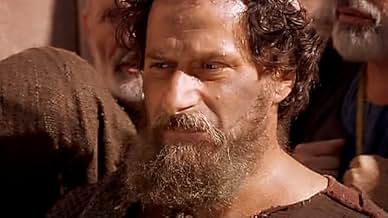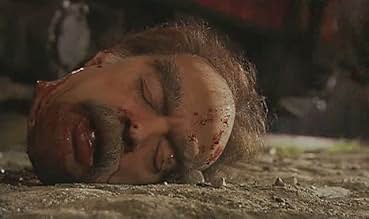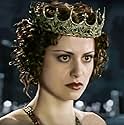VALUTAZIONE IMDb
7,5/10
5197
LA TUA VALUTAZIONE
Il diavolo e i suoi servitori visitano Mosca ai tempi del regime di Stalin. L'ideologia atea ufficiale si confronta con una serie di eventi soprannaturali.Il diavolo e i suoi servitori visitano Mosca ai tempi del regime di Stalin. L'ideologia atea ufficiale si confronta con una serie di eventi soprannaturali.Il diavolo e i suoi servitori visitano Mosca ai tempi del regime di Stalin. L'ideologia atea ufficiale si confronta con una serie di eventi soprannaturali.
- Premi
- 3 candidature totali
Sfoglia gli episodi
Recensioni in evidenza
The user review first to pop up when one opens the IMDb page is not only unfair, but IMHO idiotic. This is a masterpiece you MUST see.
As everybody who has read the novel knows (and I have read it at least four times), Master i Margarita is a 20th century masterpiece, perhaps THE 20th century masterpiece as far as novels are concerned. Theoretically, it is impossible to adapt to film. Yet Vladimir Bortko managed in this mini-series to convey to the viewer all the magical beauty, as well as the penetrating political satire, of the novel.
Of all the scenes/themes of the novel, only a single one is missed: the hoarders of hard currency locked in a theater for re-education and recanting. It is an inexplicable omission, however it does not affect the value of the mini-series. Then there are matters where one cannot follow Vladimir Bortko, as for instance the (IMHO) inconsistent alteration between BW and color. But just watch the mini-series, and you are lifted into a world of magic - magic realism for that matter. All actors are accomplished theater actors: close your eyes and you can imagine them playing Chechov on stage. The Russian they speak is seductively beautiful. I do not speak the language, and mini-series like this make me regret it: a friend of mine (native speaker) who watched it together with me was constantly laughing or frowning at parts of the video where the English subtitles gave no clue of anything. And, from a male viewer's perspective (Bulgakov was if anything a skirt chaser), you have to watch it even just for the pleasure of voyeurism. Anna Kovalchuk as Margarita is fragile, beautiful, erotic, daemonic: the woman you had always wished you had loved, and be loved by her in return. Dela the witch/vampiress is extremely seductive. And the eroticism of some scenes, most notable the Spring Ball with all these beautiful women clad only in jewelry, feathers and stiletto high-heels is, I think, impossible to beat.
I give it only 9/10, because 10/10 goes to the novel.
As everybody who has read the novel knows (and I have read it at least four times), Master i Margarita is a 20th century masterpiece, perhaps THE 20th century masterpiece as far as novels are concerned. Theoretically, it is impossible to adapt to film. Yet Vladimir Bortko managed in this mini-series to convey to the viewer all the magical beauty, as well as the penetrating political satire, of the novel.
Of all the scenes/themes of the novel, only a single one is missed: the hoarders of hard currency locked in a theater for re-education and recanting. It is an inexplicable omission, however it does not affect the value of the mini-series. Then there are matters where one cannot follow Vladimir Bortko, as for instance the (IMHO) inconsistent alteration between BW and color. But just watch the mini-series, and you are lifted into a world of magic - magic realism for that matter. All actors are accomplished theater actors: close your eyes and you can imagine them playing Chechov on stage. The Russian they speak is seductively beautiful. I do not speak the language, and mini-series like this make me regret it: a friend of mine (native speaker) who watched it together with me was constantly laughing or frowning at parts of the video where the English subtitles gave no clue of anything. And, from a male viewer's perspective (Bulgakov was if anything a skirt chaser), you have to watch it even just for the pleasure of voyeurism. Anna Kovalchuk as Margarita is fragile, beautiful, erotic, daemonic: the woman you had always wished you had loved, and be loved by her in return. Dela the witch/vampiress is extremely seductive. And the eroticism of some scenes, most notable the Spring Ball with all these beautiful women clad only in jewelry, feathers and stiletto high-heels is, I think, impossible to beat.
I give it only 9/10, because 10/10 goes to the novel.
I really enjoyed watching this mini-series in parts on You-tube. In ten parts and each having 1-5 10 mins video time. First i read the book from chapter one to chapter 7 and while still not from beginning to end i decided to watch this film too before the end of book!!! warning to all about how this can result into a split imaginary thinking when returning to the book. The way i imagined the characters to be was somewhat different to what i read but found the film to be of great comparison. It was fun to fill in with my memory all the details of the weather and settings and recalling beforehand what would be said next etc. i found the acting to be wonderful by all the cast. lively and extravagant in bringing to life all the mad players. Theatrical in dramatics. I was impressed with the CGI and special effects and myself found it them all to be great in bringing to life such beautiful scenes and characters. overall- i'd like to rewatch the whole series after book completion so i can enjoy it again.
I can't add much to the other reviews already posted here. As someone who loves Bulgakov's novel (in English translation), I was impressed and moved by this very faithful adaption to the screen. I am not sure if someone who had not read the book first would fully appreciate the work and would strongly recommend doing so before seeing the film.
There are a few minor changes from the book, some omissions and a few additions, but nothing that really changes it. The portrait of Jesus (Yeshua Ha-Notzri) and his execution are deeply moving. The major characters of Satan (Woland), the Master, Margarita and Pontius Pilate are wonderfully acted. So also are the minor characters, too numerous to list here.
One thing did puzzle me, the poor quality of the English sub-titles. Again, knowing the book minimizes the problem, but still in 2005, couldn't they have found a better translator, or used the dialog from one of the fine translations of the book?
I must give my thanks to all the people involved in this production who have given new life to Bulgakov's masterpiece.
There are a few minor changes from the book, some omissions and a few additions, but nothing that really changes it. The portrait of Jesus (Yeshua Ha-Notzri) and his execution are deeply moving. The major characters of Satan (Woland), the Master, Margarita and Pontius Pilate are wonderfully acted. So also are the minor characters, too numerous to list here.
One thing did puzzle me, the poor quality of the English sub-titles. Again, knowing the book minimizes the problem, but still in 2005, couldn't they have found a better translator, or used the dialog from one of the fine translations of the book?
I must give my thanks to all the people involved in this production who have given new life to Bulgakov's masterpiece.
This TV-series of 10 episodes, broadcast at the end of 2005 on the Russian Telekanal Rossiia, scored unprecedented ratings.
It was the second attempt of director Vladimir Bortko to film Bulgakov's masterpiece. In 2000 he had already been solicited by the Kino-Most film studio, associated with the competing channel NTV, but at the last moment the company did not succeed to come to an agreement with Sergei Shilovsky, grandson of Bulgakov's third wife, and owner of the copyrights. This time, with Rossiia, it worked. And it did not pass unnoticed.
This TV-epopee of more than 8 hours was heavily criticized, or at least regarded with much skepticism, before it was shown on screen. Sometimes it was sincere and well-grounded concern about the authenticity, but sometimes it seemed as if the Bulgakov die-hards behaved like modern Latunsky's by reproaching a movie they hadn't seen yet with sacrilege. Or maybe it was because of the gigantic publicity campaign that was launched to promote the series, and that could give reasons to fear an ambitious, but superficial Hollywood-ish production. But fortunately it wasn't the case.
In contrast with the earlier screen adaptation of Aleksandar Petrovic in 1972, director Vladimire Bortko (° Moscow, 1946) followed the book meticulously. If you have 10 times 52 minutes available for it, it is of course, easier than when you're supposed to deliver a 90 minutes movie picture. The setting of a TV-series appeared to be an ideal format to elaborate the complicated, multidimensional work with many different characters. Bortko had already shown his talent with his TV-adaptation of Fyodor Dostoevsky's The Idiot in 2003. Besides, he already filmed another novel of Bulgakov before: "Heart of a Dog", in 1988. He followed the dialogues almost word for word because, so he said, Bulgakov wrote the novel almost like a screenplay.
Ik was skeptical too when I saw the DVD at дом книги (Dom Knigi or "House of Books") in Moscow. But curiosity was stronger than skepticism and, frankly speaking, I was pleasantly surprised from the first images. Woland's meeting with Ivan and Berlioz, and the first confrontation of Pilate and Yeshua Ha-Notsri are not only beautifully portrayed and well performed, but in addition they matched remarkably well with the images that I had in mind when I first read the book.
The three layers of the novel are reflected more than well, with a well manipulated alternation of colour and black-and-white. The actors are casted accurately and they play the characters faithfully to the novel's intentions that even the most convinced skeptics shut their mouths, despite the huge success on December 29, 2005 more than 80 million people were watching.
Must I find demerits? Well... maybe the depiction of Behemoth then. With the existing technologies it could have been done better, but after all I can only conclude that, even though it is "only" TV, this series doesn't disenchant and its main merit is probably the the fact that Bulgakov now found a much bigger audience than he ever could have had with his books.
It was the second attempt of director Vladimir Bortko to film Bulgakov's masterpiece. In 2000 he had already been solicited by the Kino-Most film studio, associated with the competing channel NTV, but at the last moment the company did not succeed to come to an agreement with Sergei Shilovsky, grandson of Bulgakov's third wife, and owner of the copyrights. This time, with Rossiia, it worked. And it did not pass unnoticed.
This TV-epopee of more than 8 hours was heavily criticized, or at least regarded with much skepticism, before it was shown on screen. Sometimes it was sincere and well-grounded concern about the authenticity, but sometimes it seemed as if the Bulgakov die-hards behaved like modern Latunsky's by reproaching a movie they hadn't seen yet with sacrilege. Or maybe it was because of the gigantic publicity campaign that was launched to promote the series, and that could give reasons to fear an ambitious, but superficial Hollywood-ish production. But fortunately it wasn't the case.
In contrast with the earlier screen adaptation of Aleksandar Petrovic in 1972, director Vladimire Bortko (° Moscow, 1946) followed the book meticulously. If you have 10 times 52 minutes available for it, it is of course, easier than when you're supposed to deliver a 90 minutes movie picture. The setting of a TV-series appeared to be an ideal format to elaborate the complicated, multidimensional work with many different characters. Bortko had already shown his talent with his TV-adaptation of Fyodor Dostoevsky's The Idiot in 2003. Besides, he already filmed another novel of Bulgakov before: "Heart of a Dog", in 1988. He followed the dialogues almost word for word because, so he said, Bulgakov wrote the novel almost like a screenplay.
Ik was skeptical too when I saw the DVD at дом книги (Dom Knigi or "House of Books") in Moscow. But curiosity was stronger than skepticism and, frankly speaking, I was pleasantly surprised from the first images. Woland's meeting with Ivan and Berlioz, and the first confrontation of Pilate and Yeshua Ha-Notsri are not only beautifully portrayed and well performed, but in addition they matched remarkably well with the images that I had in mind when I first read the book.
The three layers of the novel are reflected more than well, with a well manipulated alternation of colour and black-and-white. The actors are casted accurately and they play the characters faithfully to the novel's intentions that even the most convinced skeptics shut their mouths, despite the huge success on December 29, 2005 more than 80 million people were watching.
Must I find demerits? Well... maybe the depiction of Behemoth then. With the existing technologies it could have been done better, but after all I can only conclude that, even though it is "only" TV, this series doesn't disenchant and its main merit is probably the the fact that Bulgakov now found a much bigger audience than he ever could have had with his books.
I have read M&M probably 10 times, the Michael Glenny English translation (the others are worthless). This series is a great effort to visualise Bulgakov's grand novel. It is immediately apparent that a series of short films is the best format, so good on the funders and producers for getting that right. Most scenes are just how I pictured them, which really says something for Bulgakov's powers of communication.
I really liked the cast. Initially I was very surprised at the 'old' Pilate (Kirill Lavrov - at 80!), but after 5 minutes of being mesmerised, I realised he must be one of Russia's greats (and indeed he is). Although his age is technically unrealistic for a Roman procurator of Judea, it is a masterclass in acting. Woland (Oleg Basilashvili) is a towering presence, just the right combination of menace and pathos. Kovalchuk certainly looks the part as Margarita - and I am not sure that she could have played her much differently: it is a difficult character to understand from the book, one whose actions but not thoughts are externalised.
Great music. Decent enough special effects & animatronics to cover the magic bits (some younger people will complain about them, but you are forgetting that good actors in a real theatre can make you believe anything, and there the sets are just painted wood). Overall the pace feels right. I think its an excellent overall effort.
Any true M&M fans will appreciate this work, and I am sure find it easy to ignore the small flaws.
I really liked the cast. Initially I was very surprised at the 'old' Pilate (Kirill Lavrov - at 80!), but after 5 minutes of being mesmerised, I realised he must be one of Russia's greats (and indeed he is). Although his age is technically unrealistic for a Roman procurator of Judea, it is a masterclass in acting. Woland (Oleg Basilashvili) is a towering presence, just the right combination of menace and pathos. Kovalchuk certainly looks the part as Margarita - and I am not sure that she could have played her much differently: it is a difficult character to understand from the book, one whose actions but not thoughts are externalised.
Great music. Decent enough special effects & animatronics to cover the magic bits (some younger people will complain about them, but you are forgetting that good actors in a real theatre can make you believe anything, and there the sets are just painted wood). Overall the pace feels right. I think its an excellent overall effort.
Any true M&M fans will appreciate this work, and I am sure find it easy to ignore the small flaws.
Lo sapevi?
- QuizThe film contains 163 minutes of special computer generated effects.
- ConnessioniFeatured in Legendy mirovogo kino: Kirill Lavrov
I più visti
Accedi per valutare e creare un elenco di titoli salvati per ottenere consigli personalizzati
Dettagli
- Data di uscita
- Paese di origine
- Sito ufficiale
- Lingua
- Celebre anche come
- The Master and Margarita
- Luoghi delle riprese
- Aziende produttrici
- Vedi altri crediti dell’azienda su IMDbPro
- Tempo di esecuzione
- 50min
- Colore
- Mix di suoni
Contribuisci a questa pagina
Suggerisci una modifica o aggiungi i contenuti mancanti

